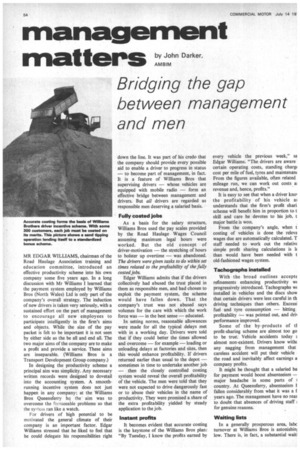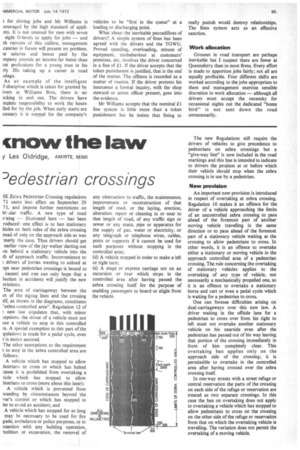management
Page 54

Page 55

If you've noticed an error in this article please click here to report it so we can fix it.
matters byiJohn Darker,
Bridging the gap between management and men
MR EDGAR WILLIAMS, chairman of the Road Haulage Association training and education committee, introduced an effective productivity scheme into his own company some five years ago. In a long discussion with Mr Williams I learned that the payment system employed by Williams Bros (North Wales) Ltd is only part of the company's overall strategy. The induction of new drivers is taken very seriously, with a sustained effort on the part of management to encourage all new employees to participate intelligently in the firm's aims and objects. While the size of the pay packet is felt to be important it is not seen by either side as the be all and end all. The two major aims of the company are to make a profit and provide a service. These aims are inseparable. (Williams Bros is a Transport Development Group company.) In designing the productivity scheme a principal aim was simplicity. Any necessary written records were designed to dovetail into the accounting system. A smoothrunning incentive system does not just happen in any company; at the Williams Bros Queensferry hq the aim was to overcome the foreseeable problems so that the syqclii ran like a watch.
For drivers of high potential to be motivated the general climate of their company is an important factor. Edgar Williams stressed that he liked to feel that he could delegate his responsibilities right down the line. It was part of his credo that the company should provide every possible aid to enable a driver to progress in status — to become part of management, in fact. It is a feature of Williams Bros that supervising drivers — whose vehicles are equipped with mobile radio — form an effective bridge between management and drivers. But all drivers are regarded as responsible men deserving a salaried basis.
Fully coated jobs As a basis for the salary structure, Williams Bros used the pay scales provided by the Road Haulage Wages Council assuming maximum legal hours were worked. But the old concept of driver-motivation — the stretching of hours to bolster up overtime — was abandoned. The drivers were given tasks to do within set times related to the profitability of the fully costed jobs.
Edgar Williams admits that if the drivers collectively had abused the trust placed in them as responsible men, and had chosen to exploit the payment system, the scheme would have fallen down. That the company's trust was not abused says volumes for the care with which the work force was — in the best sense — educated.
In setting norms, reasonable allowances were made for all the typical delays met with in a working day. Drivers were told that if they could better the times allowed and overcome — for example — loading or unloading delays at factories and sites, then this would enhance profitability. If drivers returned earlier than usual to the depot — sometimes in time to undertake another job — then the closely controlled costing system would reveal the overall profitability of the vehicle. The men were told that they were not expected to drive dangerously fast or to abuse their vehicles in the name of productivity. They were promised a share of the extra profitability yielded by steady application to the job.
Instant profits It becomes evident that accurate costing is the keystone of the Williams Bros plan: "By Tuesday, I know the profits earned by
every vehicle the previous week," sa Edgar Williams. "The drivers are aware certain operating costs, standing chargt cost per mile of fuel, tyres and maintenam From the figures available, often related mileage run, we can work out costs. al revenue and, hence, profits."
It is easy to see that when a driver kno, the profitability of his vehicle ai understands that the firm's profit shari scheme will benefit him in proportion to t skill and care he devotes to his job, t major battle is won.
From the company's angle, when t costing of vehicles is done the releva wages due are automatically calculated. T staff needed to work out the relativ( simple profit sharing calculations is le than would have been needed with t old-fashioned wages system.
Tachographs installed With the broad outlines accepte refinements enhancing productivity wt progressively introduced. Tachographs wc installed in vehicles and the discs show that certain drivers were less careful in th driving techniques than others. Excessi fuel and tyre consumption — hitting profitability — was pointed out, and dril performance improved.
Some of the by-products of tl profit-sharing scheme are almost too go to be true. Vehicle accidents today almost non-existent. Drivers know witlu any nagging from management that careless accident will put their vehicle the road and inevitably affect earnings a company profits.
It might be thought that a salaried ba for payment would boost absenteeism — major headache in some parts of 1 country. At Queensferry, absenteeism fallen considerably from what it was a f years ago. The management have no reas to doubt that absences of driving staff ; for genuine reasons.
Waiting lists In a generally prosperous area, labc turnover at Williams Bros is astonishini low. There is, in fact, a substantial waiti
t for driving jobs and Mr Williams is couraged by the high standard of applints. It is not unusual for men with seven eight 0-levels to apply for jobs — and th recruits of this calibre, management .cancies in future will present no problem. se salaries and bonus paid by the riripany provide an income far better than Dst professions for a young man in his rly 20s taking up a career in road .ulage.
As an example of the intelligent f-discipline which is taken for granted by ivers at Williams Bros, there is no )cldng in and out. The drivers have mplete responsibility to work the hours lied for by the job. When early starts are cessary it is normal for the company's vehicles to be "first in the queue" at a loading or discharging point.
What about the inevitable peccadilloes of drivers? A simple system of fines has been agreed with the drivers and the TGWU. Proved speeding, overloading, misuse of equipment, misbehaviour at customers' premises, etc, involves the driver concerned in a fine of £1. If the driver accepts that the token punishment is justified, that is the end of the matter. The offence is recorded as a matter of routine. If the driver protests his innocence a formal inquiry, with the shop steward or union officer present, goes into the evidence.
Mr Williams accepts that the nominal £1 fine system is little more than a token punishment but he insists that fining to really punish would destroy relationships. The fines system acts as an effective sanction.
Work allocation
Grouses in road transport are perhaps inevitable but I suspect there are fewer at Queensferry than in most firms. Every effort is made to apportion jobs fairly; not all are equally profitable. Four different shifts are worked according to the jobs appropriate to them and management exercise sensible discretion in work allocation — although all drivers must accept the necessity for occasional nights out the dedicated "home bird" is not sent down the road unnecessarily.






























































































